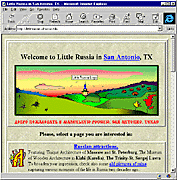 AN
ASTROPHYSICIST living in Toronto, Canada, just might be the most popular man in Russia.
Dima Verner is the founder and editor of "Anecdotes From Russia" (www.anekdot.ru), an
enormous collection of Russian jokes on the Internet. About 25,000 people visit his site
on an average weekday, some checking in a dozen times for a dose of Russian humor.
AN
ASTROPHYSICIST living in Toronto, Canada, just might be the most popular man in Russia.
Dima Verner is the founder and editor of "Anecdotes From Russia" (www.anekdot.ru), an
enormous collection of Russian jokes on the Internet. About 25,000 people visit his site
on an average weekday, some checking in a dozen times for a dose of Russian humor.
Verner's Web site is proof that Russians have begun to really sink their teeth into the
entertainment possibilities of the Internet. Forget stuffy talks on Pushkin around a cup
of chai in a cramped Soviet kitchen. Nowadays, to get a dose of Russian culture,
all you need is Internet access and a few downloaded Cyrillic fonts. (You can, of course,
find a sample of Pushkin's poetry - along with that of hundreds of other poets, past and
present - at (www.metro.ru) offers
some fascinating tidbits for public transport fans and history buffs, including an old
Soviet poster boasting the Metro as "The Exemplary Transportation System for the
Proletarian Capital!" The collection of statistics, pictures of old trains and other
information is maintained by Lebedev without any assistance from or affiliation with the
metro administration.
Among a host of other sites, Lebedev runs www.tema.ru, which features his "Collection of
Idiocies" - dictionary definitions, magazine covers and advertisements that are
funnier than their authors intended. All of his pages are works of art in themselves.
Lebedev, by the account of one Web junkie, "designed half the Russian Internet."
But even Lebedev acknowledges that the first Russian Web sites - and some of the most
entertaining ones to this day - were created by Russians who live abroad. Like everyone
else interviewed for this article, Lebedev says he regularly visits Verner's
"Anecdotes From Russia," or anekdote-roo, as it is known among its fans.
Verner, 39, a research professor at the University of Kentucky and currently a visiting
professor at the University of Toronto, says there are two reasons for the big Internet
presence of émigrés and Russians working abroad. First of all, access to computers and
the Internet were quite limited in Russia when he started anekdot.ru in 1995.
"On the other hand, everyone - including myself - wants to maintain some kind of
connection to Russia," he says. "The Internet gives us that opportunity."
Verner spends an average of three hours a day providing comic relief to thousands
without earning a penny from the endeavor. The space needed for his enormous site is
provided by anekdot.ru's sponsor, Netskate, a major Russian Internet service company.
Anekdot.ru posts dozens of new jokes every day, sent in by individuals and found on
other Web sites. And it's completely democratic: Verner doesn't censor or exclude any
jokes, even though he himself doesn't like many of them. The site has expanded to include
sections of funny stories, aphorisms and - as of this month - pictures.
Some of the jokes are timeless, but many are commentaries on contemporary Russian life.
One of the top jokes for September was: "A Volvo nicks a Jeep at an intersection.
Both cars stop, and out from the jeep spill a couple of guys in shiny warm-up suits. They
walk up to the driver of the Volvo.
"'Well, that's it, old man! Sell your car! Sell your apartment! Pay up!'
"'Who are you guys?'
"Who, us?' they ask in wonder. 'We're sportsmen!'
"The man in the Volvo gets out his gun, cocks it, says, 'Well, in that case,
READY, SET...'"
A particularly funny one from two weeks ago was more political in nature:
"'Information, how can I help you?'
"'Hello, deary, I'd like the number for ... you know, where they pay pensions.'
"'Sorry, we can't help with international calls.'"
The other main Russian server based outside Russia is "Chyortoviye Kulichki,"
which roughly translates as "The Ends of the Earth" (www.kulichki.com),
started by Valera Kolpakov, who is a dentistry student at the University of
Michigan. In addition to sites on news and politics it hosts a great number of
"fun" sites, ranging from horoscopes to a J.R.R. Tolkien fan club.
For those just starting out, the best Russian-language search engines are Yandex at www.yandex.ru and Aport at www.aport.ru. The engine at
Rambler (www. rambler.ru)
is quite competent and lists the 20-or-so most popular sites for hundreds of
topics, from literature to job hunting.
Besides these giants of the Russian Internet, there are thousands of individual sites
by Russians who are just dying to tell the world about themselves - imagine a cab driver
with a mouse and a super fast connection - often with links to their favorite Russian
music, art, literature and humor.
Some of these individual sites are well designed and written in English, providing a
good source on Russian culture and entertainment for those who fumble through those scary
Cyrillic letters.
 "Little Russia in San Antonio,
Texas" (http://little-russia.uthscsa.edu/)
is another English-language site for russophiles. It features information on and
pictures of Russian art and architecture, recordings and lyrics of Russian music -
including opera, bards, pop and old ballads, a recipe exchange and humor.
"Little Russia in San Antonio,
Texas" (http://little-russia.uthscsa.edu/)
is another English-language site for russophiles. It features information on and
pictures of Russian art and architecture, recordings and lyrics of Russian music -
including opera, bards, pop and old ballads, a recipe exchange and humor.
The home-grown sites that have sprung up within the former Soviet Union in the past two
years or so also have some gems among them. "Kulinar" (www.cooking.ru) is
the project of 19-year-old housewife Zhenya Napartovich. The site has a recipe exchange,
historical notes and information on diets among other features. Its lively design with
cartoon illustrations makes it worth a visit.
Maxim Starostin, 26, a computer engineer at the Baltic Power Plant in Narva, Estonia,
has extensive pages on aviation and on disasters at sea. But the one that gets the most
attention is his page of Lenin monuments from 33 cities of the former Soviet Union (www.ase.ee/~star/lenin/).
But perhaps the most popular site in St. Petersburg is www.mafia.ru. With quick-draw
graphics and links to tank and machine gun factories, letters from real prisoners and the
hottest porno Web sites, it's got everything the computer-literate young thug might need.
Increasingly, the Web is a good place to find information on contemporary Russian art.
While some of St. Petersburg's most prominent galleries, such as the Petropol Gallery (www.petropol.spb.ru),
use the Web primarily to plug current and upcoming exhibits, other artists'
groups have begun to more thoroughly exploit the medium. The Web site of the Mitki (www.art.spb.ru; and for something a
little more institutional, the State Hermitage Museum is online at www.hermitage.ru.
As the culture of the Internet spreads through Russian society, the Web is becoming a
great place to go not just for news and business, but for leisure of all kinds.
But, if you still think it's worth getting up from the computer and seeking your fun
out in the city, you can always check out The St. Petersburg Times' "All About
Town" section online at www.sptimes.ru.

